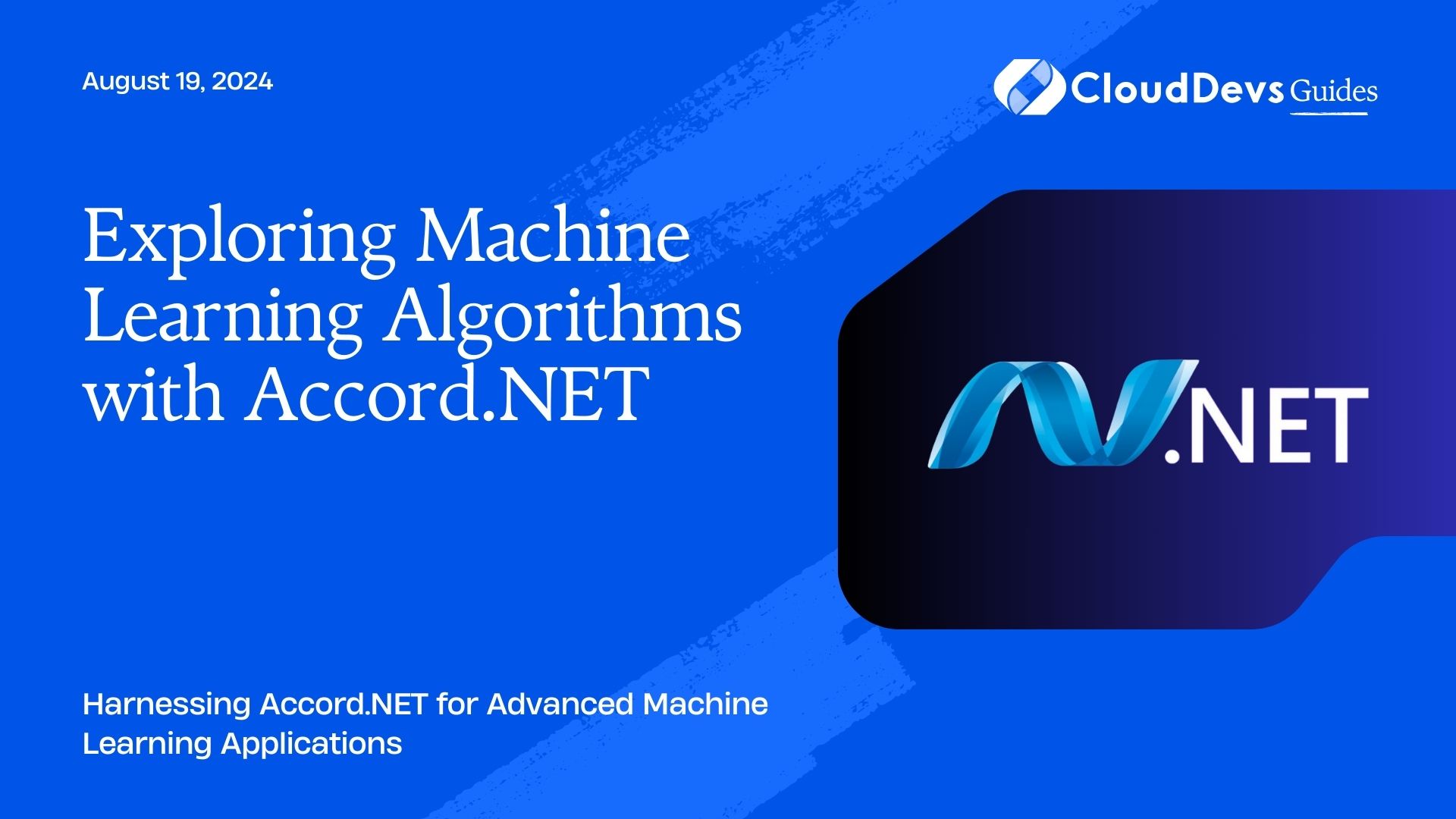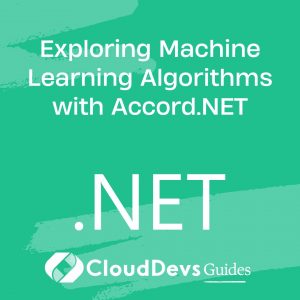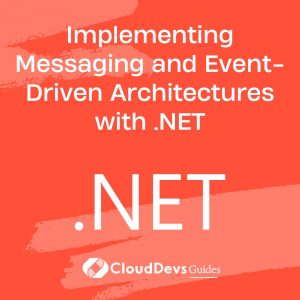Exploring Machine Learning Algorithms with Accord.NET
Table of Contents
Machine learning has become an integral part of data science, enabling powerful predictive analytics and intelligent systems. Accord.NET, a popular .NET machine learning framework, provides a wide range of algorithms and tools for implementing machine learning models. This blog explores how Accord.NET can be used to leverage different machine learning algorithms and provides practical examples to get started.

Understanding Accord.NET
Accord.NET is a .NET machine learning framework that offers a comprehensive set of tools for machine learning, computer vision, and signal processing. It supports various algorithms for classification, regression, clustering, and more, making it a versatile choice for developing advanced machine learning applications.
Using Accord.NET for Machine Learning
Accord.NET is known for its ease of use and robust functionality. Below are key aspects and code examples demonstrating how to apply different machine learning algorithms using Accord.NET.
1. Implementing Classification Algorithms
Classification is a supervised learning technique used to categorize data into predefined classes. Accord.NET provides several classification algorithms such as Support Vector Machines (SVM), Decision Trees, and Naive Bayes.
Example: Implementing a Support Vector Machine (SVM)
Here’s how you can use Accord.NET to implement an SVM for classifying data:
```csharp
using Accord.MachineLearning;
using Accord.MachineLearning.VectorMachines;
using Accord.MachineLearning.VectorMachines.Learning;
using Accord.Statistics.Kernels;
using Accord.Math;
// Sample data
double[][] inputs = // Data points
{
new double[] { 1.0, 1.0 },
new double[] { 2.0, 2.0 },
new double[] { 1.0, 2.0 },
new double[] { 2.0, 1.0 }
};
int[] outputs = // Labels
{
1, 1, -1, -1
};
// Create and train SVM
var machine = new SupportVectorMachine<Gaussian>(inputs: inputs);
var teacher = new SequentialMinimalOptimization<Gaussian>(machine, inputs, outputs);
teacher.Run(100); // Training
// Make predictions
int prediction = machine.Decide(new double[] { 1.5, 1.5 });
Console.WriteLine($"Prediction: {prediction}");
```
2. Applying Regression Techniques
Regression algorithms are used to predict continuous values. Accord.NET supports various regression methods, including Linear Regression and Polynomial Regression.
Example: Implementing Linear Regression
Here’s how you can use Accord.NET to perform linear regression:
```csharp
using Accord.MachineLearning;
using Accord.MachineLearning.VectorMachines;
using Accord.MachineLearning.VectorMachines.Learning;
using Accord.Statistics.Kernels;
// Sample data
double[] inputs = { 1.0, 2.0, 3.0, 4.0 };
double[] outputs = { 2.1, 2.9, 3.9, 4.8 };
// Create and train the regression model
var linearRegression = new Accord.Statistics.Kernels.Linear(inputs, outputs);
var teacher = new Accord.MachineLearning.VectorMachines.Learning.SupportVectorMachineLearning(linearRegression, inputs, outputs);
teacher.Run(100); // Training
// Make predictions
double prediction = linearRegression.Transform(5.0);
Console.WriteLine($"Prediction: {prediction}");
```
3. Clustering Data
Clustering is an unsupervised learning technique used to group similar data points. Accord.NET offers clustering algorithms such as K-Means and Gaussian Mixture Models.
Example: Implementing K-Means Clustering
Here’s how you can use Accord.NET to perform K-Means clustering:
```csharp
using Accord.MachineLearning;
using Accord.MachineLearning.VectorMachines;
using Accord.MachineLearning.VectorMachines.Learning;
using Accord.Math;
// Sample data
double[][] data =
{
new double[] { 1.0, 1.0 },
new double[] { 1.5, 1.5 },
new double[] { 3.0, 3.0 },
new double[] { 3.5, 3.5 }
};
// Create and train the K-Means algorithm
var kmeans = new KMeans(2); // Number of clusters
var clusters = kmeans.Learn(data);
// Display the results
for (int i = 0; i < data.Length; i++)
{
int clusterIndex = clusters.Decide(data[i]);
Console.WriteLine($"Data point {i} is in cluster {clusterIndex}");
}
```
4. Evaluating Model Performance
Evaluating the performance of machine learning models is crucial for understanding their effectiveness. Accord.NET provides tools for measuring various performance metrics, including accuracy, precision, and recall.
Example: Evaluating Classification Performance
Here’s how you can evaluate a classification model’s performance using Accord.NET:
```csharp
using Accord.MachineLearning;
using Accord.MachineLearning.VectorMachines;
using Accord.MachineLearning.VectorMachines.Learning;
using Accord.Statistics.Kernels;
using Accord.MachineLearning.VectorMachines.Learning;
// Sample data and predictions
int[] trueLabels = { 1, 1, -1, -1 };
int[] predictedLabels = { 1, 1, -1, 1 }; // Example predictions
// Calculate performance metrics
double accuracy = trueLabels.Zip(predictedLabels, (t, p) => t == p).Average();
Console.WriteLine($"Accuracy: {accuracy * 100}%");
```
Conclusion
Accord.NET offers a powerful set of tools and algorithms for implementing machine learning models in .NET applications. Whether you are working with classification, regression, clustering, or evaluating model performance, Accord.NET provides a robust framework to support your machine learning needs. By leveraging these capabilities, you can develop sophisticated data analysis and predictive modeling solutions.



